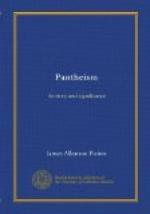[Sidenote: It is an Eternal Whole, of which a Partial consideration is Misleading.]
Now, according to Spinoza, when we see things as they appear in Infinite Thought we have an adequate idea. But if we see only a component element in an idea—let us say—of the divine Artist, then our idea is inadequate.[21] Hence we misjudge things. And of the part played by bad men in the divine Whole we certainly have no adequate idea. But here again we must be on our guard against the abuse of illustrations. For it is not to be inferred that Spinoza regards the Universe as an unfinished picture, of which, the completion will justify the beginning. On the contrary, the Universe is to him eternal, the necessary expression of the infinite attributes of eternal Being. Still the analogy may help us. For the concentration of attention on a single part of an ordered whole may, quite as certainly as a glance at an unfinished work, be the occasion of an inadequate idea. In effect, the suggestion is that if we, like God, could contemplate the infinite Universe all at once, and have an adequate idea thereof, in other words if we could ascend to the self contemplation of the Eternal, we should have the bliss associated by long habit with the words of the Psalmist: “I shall be satisfied when I awake, with thy likeness.” Such bliss, however, is only approximately attainable in moments of mystic transport. And when, as in so many experiences, we see only in part, and have inadequate ideas, faith in the Eternal Whole is needed to keep us from blasphemy.
[Sidenote: Doctrine of Man Resumed.]
[Sidenote: Final Cause Replaced by Idea.]
[Sidenote: Freedom, Purity, Love.]
With such necessarily brief hints as to Spinoza’s attitude towards evil, I resume his doctrine of man—the individual creature as a centre of action. Of final causes Spinoza will not hear. But if instead of asking “what is the chief end of man,” we ask what is the idea of man, Spinoza answers that it is the realization of a mode of the divine attributes, extension and thought. And if this should seem unsatisfying, let it be remembered that to this devout Pantheist the divine attributes and their modes were the expression of the very substance and life of God. Now with “extension,” for reasons already given, we need not trouble ourselves except to say that at least Spinoza’s teaching would suggest the idea of mens sana in corpore sano. Because to him the mind was the “idea” of the body, and the body the “object”—not quite in the modern sense—of the mind. But as regards the human mode of the divine attribute of thought, Spinoza makes its ideal to be a life absorbed in such contemplation of “the Blessed God,” the infinite Whole, as shall react on the creature in inspirations of freedom, purity and love.
[Sidenote: Idea of Freedom.]




